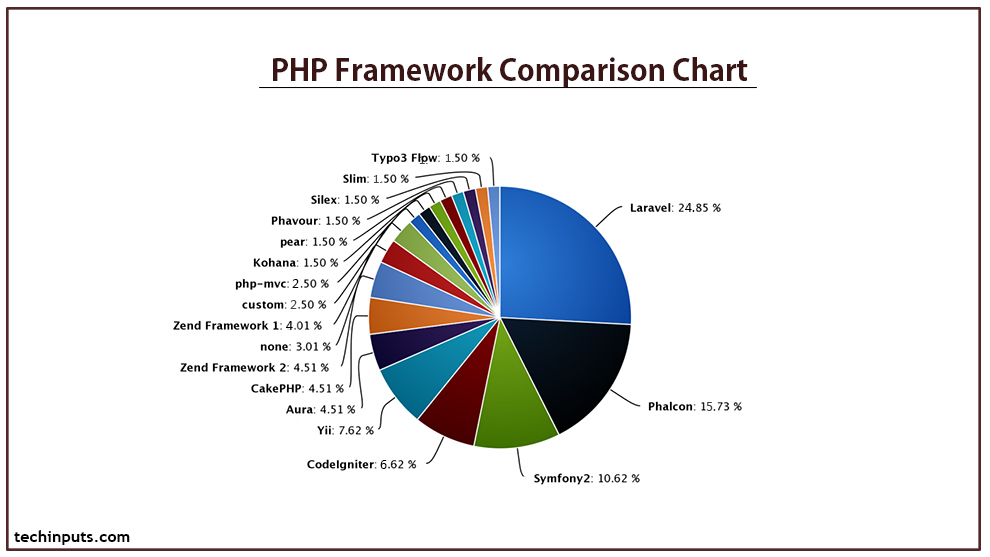PHP frameworks help php programmers to write clean and reusable code. They follow the MVC pattern, ensuring a clear separation of logic and presentation. However there are different opinions on which framework is the best one, since few developers lean towards execution, some incline towards better documentation, some prefer lots of built-in functions, etc.
Choosing the most suitable PHP framework can be a challenge if you don’t know what features to compare and prioritize. While trying to make the choice, we have analyzed most of the PHP frameworks and listed below the best 5.
Laravel :
Laravel is an open source framework. It has an extremely rich set of features which will boost the speed of web development. If you are familiar with Core PHP and Advanced PHP, Laravel will make your task easier. It will save a lot of time if you are planning to develop a website from scratch. Not just that, the website built in Laravel is also secure. It prevents various attacks that can take place on websites.
Some of the key features of Laravel framework
- Modularity
- Testability
- Routing
- Configuration management
- Query builder and ORM (Object Relational Mapper)
- Schema builder, migrations, and seeding
- Template engine
- E-mailing
- Authentication
- Redis
- Queues
- Event and command bus
CodeIgniter :
CodeIgniter is an application development framework, which can be used to develop websites, using PHP. Its goal is to enable you to develop projects much faster by providing a rich set of libraries for commonly needed tasks, as well as a simple interface and logical structure to access these libraries.
Some of the key features of CodeIgniter framework
- Model-View-Controller Based System
- Extremely Light Weight
- Full Featured database classes with support for several platforms
- Query Builder Database Support
- Form and Data Validation
- Security and XSS Filtering
- Session Management
- Email Sending Class. Supports Attachments, HTML/Text email, multiple protocols (sendmail, SMTP, and Mail) and more.
- Image Manipulation Library (cropping, resizing, rotating, etc.). Supports GD, ImageMagick, and NetPBM
- File Uploading Class
- FTP Class
- Localization
- Pagination
- Data Encryption
- Benchmarking
- Full Page Caching
- Error Logging
- Application Profiling
- Calendaring Class
- User Agent Class
- Zip Encoding Class
- Template Engine Class
- Trackback Class
- XML-RPC Library
- Unit Testing Class
- Search-engine Friendly URLs
- Flexible URI Routing
- Support for Hooks and Class Extensions
- Large library of “helper” functions
Yii :
The Yii framework is an open-source PHP framework for rapidly-developing, modern Web applications. Yii provides secure and professional features to create robust projects rapidly. The Yii framework has a component-based architecture and a full solid caching support. Accordingly, it is compatible for building all kinds of Web applications: forums, portals, content managements systems, RESTful services, e-commerce websites, etc. It also has a code generation tool called Gii that includes the full CRUD(Create-Read-Update-Delete) interface maker.
Some of the key features of Yii framework
- Yii implements the MVC architectural pattern.
- Yii never over-designs things for the sole purpose of following some design pattern.
- Yii provides multi-tier caching support.
- Yii provides RESTful API development support.
- It provides features for both relational and NoSQL databases
- It is extremely extensible.
- It has high performance.
Phalcon :
Phalcon is an open source, full stack framework for PHP written as a C-extension, optimized for high performance. You don’t need to learn or use the C language, since the functionality is exposed as PHP classes ready for you to use. Phalcon is also loosely coupled, allowing you to use its objects as sticky components based on the needs of your application.
Some of the key features of Phalcon framework
- PHP C-extension
- MVC
- Dependency Injection
- RESTful services
- Auto-loader
- Router
CakePHP :
CakePHP is an open source framework. It makes developing, deploying and maintaining applications much easier. CakePHP has number of libraries to reduce the overload of most common tasks.
Some of the key features of CakePHP framework
- MVC Framework
- Template Engine
- Caching Operations
- Search Engine Friendly URLs
- Easy CRUD (Create, Read, Update, Delete) Database Interactions.
- Libraries and Helpers
- Built-in Validation
- Localization
- Email, Cookie, Security, Session, and Request Handling Components
- View Helpers for AJAX, JavaScript, HTML Forms and More
Here is the comparison chart of PHP frameworks in order to help you choose the best framework adapted to your specific need.
| Features | Laravel | CodeIgniter | Yii | Phalcon | CakePHP |
| ORM | Active Record | Active Record | Database Access Objects, Active Record | Database Access Objects, Active Record | Custom |
| Cache Storage | APC, Memcache, Xcache, Wincache, File System, Redis, Database, Memory | Memcache, Xcache, APC, File | APC, Memcache, Xcache, Wincache, Database, File, eAccelerator, ZendPlatform | Memcache, Xcache, APC, File, Redis | Memcache, APC, File, Redis |
| Template System | Blade templating system | Simple template parser | PHP and Pardo’s-Several others using extensions(Razor, Smarty, Twig etc.) | Volt templating system | Custom but Smarty/Twig can be used |
| Web 2.0 | Jquery, HTML 5 Boilerplate | Built-in Jquery, Extendable to any javascript framework | RESTful Services | Full Jquery, Grid System, Native Ajax, RESTful | |
| Security | CSRF, XSS, SQL Injection | CSRF, XSS, SQL Injection | CSRF, XSS, SQL Injection | CSRF, XSS, SQL Injection | CSRF, XSS, SQL Injection |
| Testing Library | PHP Unit | PHP Unit | PHP Unit, Selenium | PHP Unit | PHP Unit |

